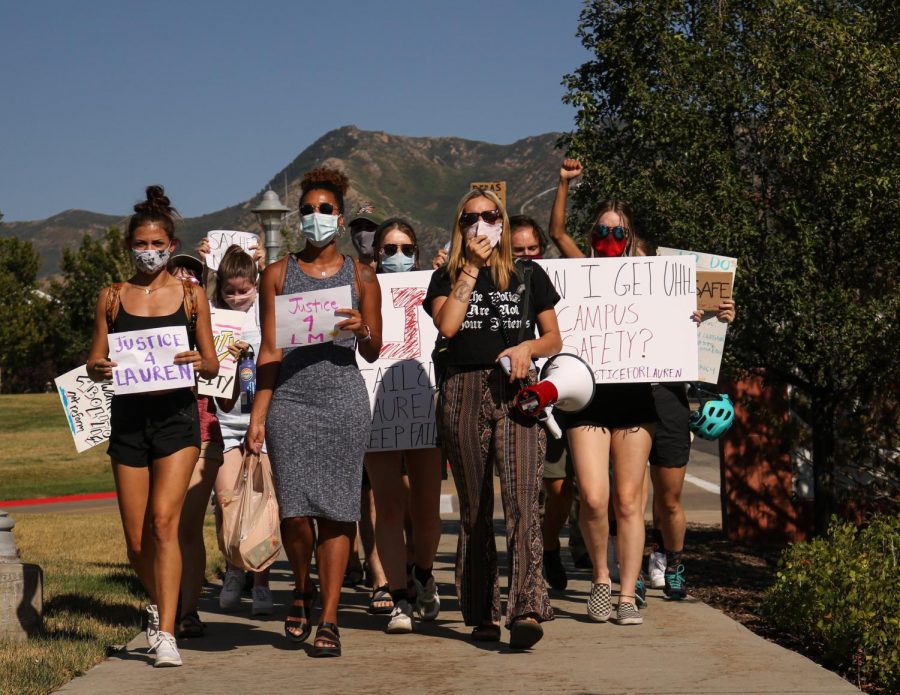Hargis: Universities Must Step Up for Student Safety
UnSafe U protesters march from the Public Safety Building to President’s Circle on the University of Utah campus in Salt Lake City to protest the actions of officers involved in the Lauren McCluskey case on Aug. 6, 2020. (Photo by Ivana Martinez | The Daily Utah Chronicle)
May 17, 2023
From April 27 until May 1, a series of homicides rocked the close-knit town of Davis, California. Three civilians, including a UC Davis undergraduate student, were stabbed repeatedly as they walked or slept in the late spring warmth.
It was heartbreaking news to the local community and to students everywhere. While a suspect was arrested for the stabbings on May 4, the institution’s population was still rocked to its core. The university’s response to the events was severely lacking.
Unfortunately, such violent incidents are not isolated to Davis. College campuses all over the United States carry a feeling of danger. Crime is hugely common in and around universities, including the University of Utah. This leaves students wondering if their universities are doing anything to ensure their safety. The cases in Davis are a perfect example of tragedies shaking up communities and the ineptitude of universities.
The Davis Stabbings
Carlos Dominguez, 21, was expelled from school for academic reasons on April 25. Two days later, he stabbed and killed David Henry Breaux as he slept in a park. He attacked two others in the span of five days — Kimberlee Guillory and 20-year-old student Karim Abou Najm.
The university released statements commenting on the collective shock, yet expected students to still attend classes despite their fear and anxiety. While UC Davis moved evening classes online, it only advised extracurriculars to be canceled and told students to walk in groups if they felt uneasy. In the middle of dealing with grief and fear, students were expected to keep up their appearances on campus and continue business as usual.
While Dominguez had been expelled and lived off-campus, students and community members found that the university’s response was less than satisfactory. Students felt they hadn’t yet processed the terrifying events and felt anxiety and paranoia about those around them. Some were hyper-aware of their peers because Dominguez could’ve been hiding among them, and others experienced full anxiety attacks at the prospect of attending the campus.
The Associated Students of UC Davis wrote a letter to UCD’s Academic Senate, balking at their response to the stabbings. The president of ASUCD, Radhika Gawde, called the university’s decision to still hold in-person classes “disgraceful.” She also highlighted a survey where more than 4,000 students reported feeling unsafe visiting the campus.
“The students were right to be afraid,” Gawde wrote. “The perpetrator was a student and had access to and knowledge of all of the buildings and facilities all UC Davis students do. The Academic Senate knowingly forced students to choose between their safety and their academic success and should feel ashamed for doing so.”
Violence at the University of Utah
After the UC Davis commotion, I was painfully reminded of the shortcomings of our own campus. There have been multiple incidents where the campus has admitted fault and neglect in violent situations, from the murder of Zhifan Dong last February to the Lauren McCluskey case in 2018.
There are multiple parallels between these two cases and the murders in Davis. Students in Davis insisted that the university wasn’t doing enough — they met students’ concerns with neglect and delay. In both murder cases that took place at the U, the women reached out multiple times to campus resources for help and were met with, again, ignorance and delay. Both cases ended in death.
When fear-inducing events like these happen in college communities, universities have a responsibility to their students. Universities must take it upon themselves to create safe, secure and monitored environments where students feel cared for and listened to. The student body shouldn’t have to choose between academics and their own safety, especially when those events are ending in the loss of students’ lives. Campus safety is becoming a nationwide concern — not just at UC Davis and the U. Violent crimes and mass killings are increasing all over the country, campuses included. Students often don’t feel safe on campuses, or feel they won’t be advocated for if they reach out to authorities for help.
What Next?
Hopefully, the Davis incident works as a wake-up call for the security departments in universities all over the country. The trend is clear as day — as tensions rise in the United States, violent crimes will continue to happen unless big institutions step in to ensure the safety of their patrons. In other words, universities have to start showing respect and care to their students, or their students will not trust them anymore. This has already happened here at the U, and it’s the U’s problem to fix.








